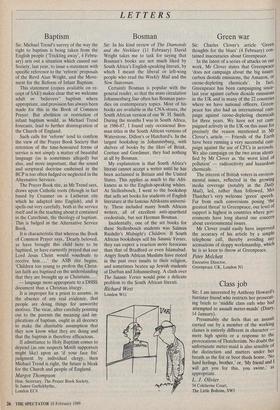LETTERS Baptism
Sir: Michael Trend's survey of the way the right to baptism is being taken from the English people (`Trickling away', 4 Febru- ary) sets out a situation which caused our Society, last year, to issue a statement with specific reference to the 'reform' proposals of the Revd Alan Wright, and the Move- ment for the Reform of Infant Baptism.
This statement (copies available on re- ceipt of SAE) makes clear that we welcome adult or 'believers" baptism where appropriate, and provision has always been made for this in the Book of Common Prayer. But abolition or restriction of infant baptism would, as Michael Trend forecasts, Iead to further disintegration of the Church of England.
Such calls for 'reform' tend to confirm the view of the Prayer Book Society that retention of the time-honoured forms of service is not simply a matter of beautiful language (as is sometimes alleged) but also, and more important, that the sound and scriptural doctrine enshrined in the BCP is too often fudged or neglected in the Alternative Services.
The Prayer Book rite, as Mr Trend says, draws upon Catholic roots (though in fact based by Cranmer on a Lutheran rite which he adapted into English), and it spells out very carefully, both in the service itself and in the teaching about it contained in the Catechism, the theology of baptism. This is fudged in the Alternative Service Book.
It is characteristic that whereas the Book of Common Prayer says, 'Dearly beloved, ye have brought this child here to be baptised, ye have earnestly prayed that our Lord Jesus Christ would vouchsafe to receive him....' the ASB rite begins, `Children too young to profess the Christ- ian faith are baptised on the understanding that they are brought up as Christians....'
— language more appropriate to a DHSS. document than a Christian liturgy.
It is improper for a priest to assume, in the absence of any real evidence, that people are doing things for unworthy motives. The vicar, after carefully pointing out to the parents the meaning and im- plications of baptism, ought in all decency to make the charitable assumption that they now know what they are doing and that the baptism is therefore efficacious.
If admittance to Holy Baptism comes to depend (as one suspects Morib supporters might like) upon an 'if your face fits' judgment by individual clergy, then Michael Trend is right, the future is bleak for the Church and people of England. Margot Thompson
Hon. Secretary, The Prayer Book Society, St James Garlickhythe, London EC4


















































 Previous page
Previous page